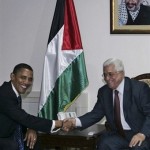Is Obama Changing Course in the Middle East?
 Obama appears to finally be applying pressure on the Palestinians. But does this development signal a new approach to the Middle East?
Obama appears to finally be applying pressure on the Palestinians. But does this development signal a new approach to the Middle East?
In her July 26th Jerusalem Post column, Caroline Glick noted that there seems to be evidence that the Obama Administration has shifted its efforts in the Middle East from trying to establish a Palestinian state towards taking effective action against stopping Iran from acquiring nuclear weapons.
It’s only been a few weeks since Israeli Prime Minister Benjamin Netanyahu met President Obama at the White House. After their summit Aluf Benn of Israel’s Haaretz wrote, “President Barack Obama’s campaign of wooing Israel reflects a fundamental about-face in US policy in the Middle East. Another respected Israeli commentator Ehud Ya’ari wrote in The Australian, “The foreign policy team of US President Barack Obama is undertaking a reassessment of its policy all over the Middle East, including Israel.” Both pundits claimed that the American administration had decided to cooperate with Israel as an ally rather than to attack it as an obstacle to peace. By inviting Netanyahu to Washington they argued Obama was essentially exposing the pragmatism of his Middle East policy.
You can also get the impression that the Obama Administration has changed its Middle East policy from a Palestinian Authority memo that was leaked by the Associated Press. The 36-page document claimed that US Middle East envoy George Mitchell had warned Palestinian leader Mahmoud Abbas that he must move quickly to direct talks with Israel if he expects President Obama to help him establish a Palestinian state. The memo additionally claimed that Mitchell urged Abbas to take advantage of this fleeting opportunity and he cautioned Abbas not to count on Netanyahu being replaced by another Israeli leader.
Abbas has taken the position that he won’t restart direct talks with Israel unless they accept that a Palestinian state be created along the lines which existed before the 1967 Six Day War, and agree to a settlement freeze in the West Bank and East Jerusalem. Palestinian negotiator Saeb Erakat said that the memo was based on notes taken of an oral presentation he made to the leadership of the Fatah party and that not all of the points in it are entirely accurate. But Erakat does admit that US officials told Abbas that if he wants Obama’s help, he must engage in direct talks with the Israelis. Thus, it appears that, for the first time since it has been in office, the Obama Administration is putting pressure on Abbas.
Yet, Glick has good reason for arguing that the supposed change in the Obama Middle East policy is illusory. There is, for instance, no new concern with the prospects of Iran going nuclear. Last month, CIA Director Leon Panetta admitted that UN sanctions would “probably not” deter Iran. It’s hard to argue when Glick writes:
This understanding would be sufficient to convince a pragmatic administration that force must be used to prevent Iran from becoming a nuclear power. A pragmatic administration, after all, could be expected to understand what a nuclear armed Iran would mean for the US’s strategic interests in the region.
Glick enumerates what she considers the likely harmful consequences for the United States of a nuclear Iran: havoc on oil shipments from the Persian Gulf; the inability for the United States to safely project force in the region; and the expulsion of US forces from Kuwait, Bahrain, and Qatar as these countries “cut deals” with the new regional power.
While it pays only lip service to the threat from Iran, Glick points out that the Obama Administration has not relented on giving the Palestinian Authority full sovereignty. Last week, it decided to upgrade the status of the Palestinian mission in Washington. It will be allowed to fly a flag like the embassy of a nation-state. Maen Areikat, the PA’s representative in Washington, claims that this gives the Palestinian Authority the same status as Canada or the states of Western Europe. That might be something of an exaggeration, but the gesture is not inconsequential. The PA now has a higher diplomatic status in Washington, with a “delegation general”, than Taiwan, a democratic ally, has with an “economic and cultural representative office”.
Furthermore, according to the Associated Press report, the leaked memo says that if Abbas takes part in direct negotiations with Netanyahu, “the US can push forcefully for the establishment of a viable Palestinian state”. On the other hand, if Abbas refuses to talk with the Israelis, “Obama may not be able to be of much help, get the settlement curb extended, or prevent the demolition of Arab homes in east Jerusalem”. In my July 9th posting, just after Netanyahu and Obama had met, I cited an opinion from a distinguished political commentator, Barry Rubin, who thinks that Israel will not be forced to make concessions that will compromise its vital interests. Events since then suggest that Rubin’s original prediction may have been overly optimistic.